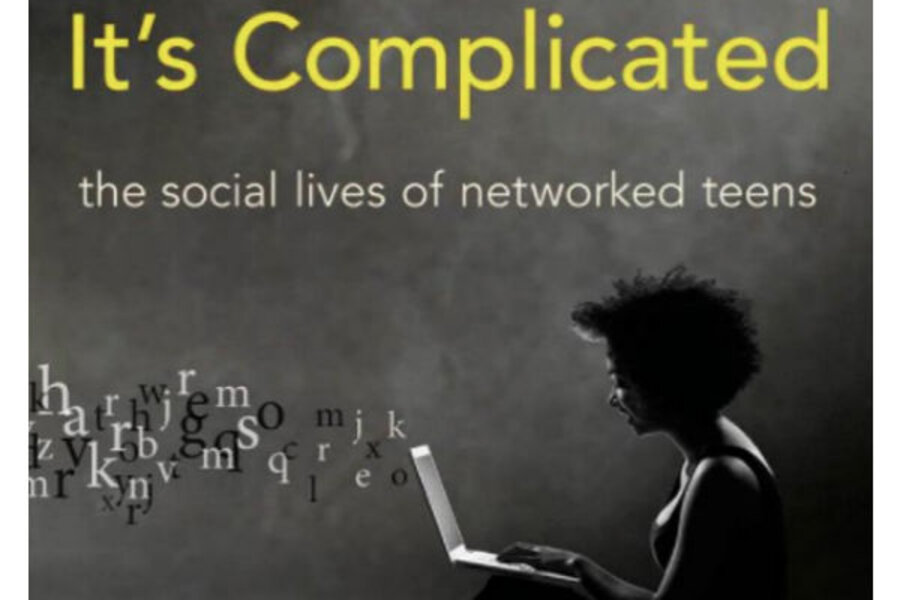Danah Boyd Q&A: What are teenagers really doing online?
Loading...
| New York
Danah Boyd has made a name for herself at the research division of Microsoft for painstaking work examining social media, Big Data, and the tension between public and private lives. But it's her teens'-eye view of the digital world that sets her apart.
Now, Boyd has written her first book, "It's Complicated: The Social Lives of Networked Teens," out in February from Yale University Press and available for free on her website, Danah.org. Earlier this year, she added another accomplishment to her list: mom.
Boyd interviewed more than 150 teens from a range of backgrounds for the book, also relying on extensive research on all aspects of their digital lives.
Five questions for Danah Boyd:
Q: What do parents need to understand about the online lives of teens?
Boyd: They need to realize that young people are doing the same things online as we all did as kids in other places where we gathered with our friends. They're hanging out. They're messing around with each other. They're socializing. They're flirting. They're gossiping. They're joking around, and much of this is perfectly reasonable teen stuff. Some of it is problematic. Some of it is glorious.
But the kinds of places young people used to gather are no longer accessible for a variety of reasons. The first is a level of fear and anxiety that exists, the result of 24-7 news, where there's a sense that there's terrible things happening to kids everywhere. We've transferred all that fear and anxiety to their online lives, but to them it's a release valve, to finally find a place where they can hang out. It's not that they're addicted to the technology. It's that they want a place where their friends are.
Q: You write that too many young people live genuinely high-risk lives, but you conclude that most of those risks do not originate with technology. Can you explain?
Boyd: There are young people who are living high-risk lives, period, end of story. They are being abused every day at home. There are young people who are struggling with poverty, with addiction, with mental health struggles. They make that visible online.
One of the challenges becomes how do we intervene to help them? Unfortunately what we tend to do is we try to make the Internet go away instead. We hope that if we make the visibility go away, the problem will go away. But that's not true.
Q: Why do young people share so publicly?
Boyd: Young people are trying to be IN public, but that doesn't mean that they want to BE public, and that distinction is really important. There's a mistaken understanding that they want everything about themselves to be recorded forever, and that's not true at all.
They're really frustrated when all of this material is stored away and gets them into trouble. Young people face an unprecedented level of surveillance. Not just by the institutions of power, but by their parents. Most of them are sitting there going, 'Why do these people feel like they have a right to be in my business?'
Q: Can you explain social steganography?
Boyd: It's actually an old cryptography term. It basically is the notion of hiding in plain sight. So the old notion is that Greeks used to tattoo messages on the heads of their slaves, let their hair grow out and then send them off to places, and only if you knew where to look would you know where the message lies.
What's really funny is that young people have started encoding everything they're putting up online, so you can read it literally but you have no idea what it means. It's a song lyric but you don't know the reference because the reference is really about the friends who got together last weekend and they had a cool in-joke for which the song was playing and hahahahaha.
... Just because you have access to the content doesn't mean you have access to the meaning. It's never been the case that parents got to listen to everything, but the thing is parents have demanded now that they have the right to listen to everything. I think it's a little ironic that teenagers are using the same tactics as political dissidents.
Q: What is your best advice for parents struggling to understand the networked lives of their teens?
Boyd: Step back, try to stay calm and try to listen to your kids. What are they trying to achieve? How are they trying to go about this, and how can you give them the space to do it? We forget how stressed out this cohort of young people is. That's not because of technology. That's because of the amount of pressure that we put on them.
___
Follow Leanne Italie on Twitter at http://twitter.com/litalie
Copyright 2014 The Associated Press. All rights reserved. This material may not be published, broadcast, rewritten or redistributed






